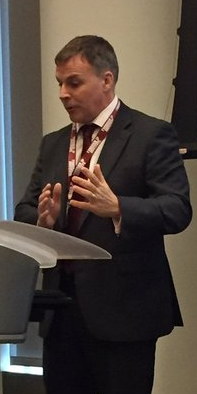
 Photo credit: Managing IP
Photo credit: Managing IP
THE EPO's management isn't alone; some people do in fact stand to benefit from its so-called 'reforms', notably Team UPC. But only if the UPC ever becomes a reality, which seems far-fetched a concept. They try to make it desirable and inevitable, but it's anything but.
"IP Kat does censor comments, but apparently not as zealously as Kluwer."Bristows, a core part of Team UPC in the UK, is exploiting external blogs for marketing, as almost nobody reads (or even knows about) its own blog. They're doing this not just in IP Kat (two more puff pieces from the Bristows lobbyist there yesterday and another one this morning, with pro-trolls bias) but also in Kluwer, which doesn't seem to mind poor track record of the messengers (they may also be falsifying quotes). Brian Cordery (Bristows) published something in Kluwer some days ago and it didn't go too well, especially if commenters are not denied a voice. In IP Kat, for example, whenever there is an article promoting the UPC we find that almost every single comment refutes it. IP Kat does censor comments, but apparently not as zealously as Kluwer.
"Have you seen the discussion in the comment section here," one reader asked us, pointing to this puff piece which boils down to amplifying Team Battistelli. "Very remarkable," our reader called it. Here is the key part from this echo chamber, which excluded critical voices as usual:
The second session looked at the topic of Brexit and IP. Margot Fröhlinger, the Principal Director of Patent Law and Multilateral Affairs, spoke first. She addressed the state of implementation of the Agreement. 12 have ratified so far but not Germany and the UK. Both however are on track – according to the latest reports. Turning to the impact of Brexit, Margot noted that most commentators had initially assumed Brexit was the death knell for the UK’s participation in the UPC and possibly for the whole project. Over time, these views had softened but it was still a surprise when the UKIPO announced on 28 November 2016 that the UK was going to proceed with ratification. Nevertheless this was seen as very positive news by proponents of the system. Margot considered that the UK’s participation could be secured if there was sufficient political will, given the marginal influence of the CJEU in the UPC regime. Moreover in the unlikely event that the UK left the system, arrangements will be put in place to ensure that participants are not prejudiced. Margot felt that the system would be impoverished without the UK judges and practitioners. Panellist Joel Smith thought that there was political will for the UK participation but it was just one of many pieces in a very complicated puzzle. Panellist Trevor Cook wondered if we may end up with the UPC system applying in the UK but not unitary patents. Judge Klaus Grabinski thought that all options remained on the table and Margot Fröhlinger pointed to Denmark’s involvement in the Brussels Regulation as a precedent.
UPC and the Brexit
Declaring that the influence of the CJEU in the UPC regime will be marginal is quite daring and has more to do with wishful thinking than a robust analysis of the situation.
That a lot of stakeholders, especially UK law firms, would like UK to stay in the UPC is understandable but does not make it more likely.
In any case, it is a bare minimum to consider that arrangements will be put in place to ensure that participants are not prejudiced should UK leave the UPC. The contrary would be astonishing.
Overall, it is nevertheless doubtful that that UK will stay in the UPC after Brexit. If this would be the case, it would mean that EPLA is revived in a different form. It is anything but sure and certain that the CJEU would agree on this. Ever heard of Opinion 1/09? It makes it even more strange to decide upfront about the marginal influence of the CJEU….
I hope that this post will be published, contrary to my earlier one. In the contrary I would like to be told the reasons for non-publication. If only nice things can be said in a blog, then it is not a blog....
Having had two comments blocked, I take it for acquired that any comment slightly critical of the UPC and hence not corresponding to the interests of Brystows is not to be published in this blog.
I find this appalling. A blog is there to confront points of view, not to exclusively express a positive opinion on the UPC and/or considering a post-Brexit participation of UK in the UPC highly likely.
Even IPKat accepts dissenting opinions.
I am therefore not agreeing with Techrights that IPKat has been taken over by Brystows. I am even of the opinion that often Techrights deserves the cause it wants to help in being apodictic and extreme in its view.
Should I not get a reply giving me the reasons as to why my comments were blocked, I will make the matter public.
The above comment was not to made public at once. I want a detailed reply first.
The author would like to point out that he was just reporting the views of those expressed by the speakers at the conference. Personally, he feels that where there is a political will, a way will be found. Though he recognises that there is a long road ahead.

Daniel Thomas laments that his postings were “blocked”. I sympathise with him. But readers will be aware that blocking is sometimes appropriate. For example, if you follow the lively Patently-O blog (or the Comments threads on the UK newspaper The Guardian), you will know that some posters are offensive and so it is appropriate to “block” their offensive outpourings.
Of course, it is a difficult judgement, what has to be “blocked”. Me, I cannot imagine Daniel Thomas ever being offensive. In my experience he is an exceedingly courteous man.
Daniel, the blockings on Patently-O are done by a computer and often for me inexplicable. Perhaps something like that happened here, with your non-appearing postings?
Please note that, unfortunately, this “blog” is primarily not an academic playground, but rather a marketing tool for Kluwer and their authors, trying to push public opinion in a way suiting their needs. Another example for such tool is the above mentioned IPkat blog after Jeremy’s departure.
As a consequence, it should not come as too much of a surprise that comments expressing a view contradicting that of Kluwer et al are swept under the blanket. For instance, they have long abandoned publishing critical voices on the UPC as it would be required for an open debate and instead prefer presenting their exclusive narrative on how things stand and where they go. Of course, usually this has not much to do with reality which allows certain deductions to be made as regards the UPC project as a whole if it can only be kept alive based on skewed perspectives and the input of obviously biased individuals, apparently having to be protected from an open discussion.
From an academic standpoint and the perspective of free speech, this is a rather depressing situation, but clearly it is the path Kluwer et al have chosen to follow. We will see if this comment makes it to publication or whether it will be suppressed as many others. In the latter case, there will at least be a screenshot confirming that it has been successfully submitted.
"IP Kat used similar excuses as well. They censored me several times -- to the point where I complained to the blog's founder and altogether stopped commenting there."Bristows are, as always, utterly terrible liars and the more they do this shameful suppression of speech, the more eager we are to expose what they're up and stop them. Brian Cordery and his colleagues long ago abandoned facts; all they care about is money. Cordery concluded the thread with: "The author reiterates that all non-derogatory comments will be published and apologises for any delay caused due to his travel schedule."
Well, there was probably nothing derogatory in them (nobody can see to verify); that's just a typical excuse after removing 'unwanted' comments. IP Kat used similar excuses as well. They censored me several times -- to the point where I complained to the blog's founder and altogether stopped commenting there. ⬆
"Proverbs are always platitudes until you have personally experienced the truth of them."
--Aldous Huxley